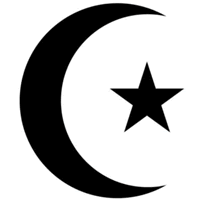“There is no deed more precious in the sight of Allah, nor greater in reward, than a good deed done during the ten days of Sacrifice.”
Prophet Mohammad reported by Ibn Abbas

[Published Dec. 9, 2008] It brings me great joy to write about Eid al-Adha today. Not just because it’s one of the holiest days of Islam, and one of only two Eids (Festivals).
It’s also because Eid al-Adha is the first holiday I wrote about for Every Day’s a Holiday, which means we’ve come almost full circle. Since the Islamic calendar is 11 days shorter than the Gregorian calendar, it hasn’t quite been a solar year, but we’re getting there.
I have learned so much about the Islamic calendar over the past year, my head hurts. I used to think, Why does the Islamic calendar have to be different from every other calendar in the world? Not all calendars are 365 days long, but at least they make some effort to correct themselves every few years. A leap day, leap week, leap month. Leap something! The Islamic calendar says, uh-uh. Pay no heed to seasons. A month observed in the summer 15 years ago is observed in the winter now, and vice-versa.
It struck me as counterintuitive. Or some kind of weird trick to play on kids. But now, after following the calendar through a full cycle, I see two reasons.
The first is that as all other calendars shift in relation to the Islamic calendar, Muslims get to share and contrast their celebrations and holy days with all other cultures.
This year, 1429 AH (2008 AD), Ashura was observed the between the Baha’i Faith’s World Religion Day and the first day of Christian Unity Week of Prayer.
The holiest third of the month of Ramadan just touched the ten days of atonement of the Jewish calendar, observed between the High Holy Days. Precisely as Muslims broke the fast with Eid al-Fitr, the Jews began the fast of Rosh Hashanah.
And Eid al-Adha this week coincides with the Catholic Festival of the Immaculate Conception (December 8), both of which speak to the bond between parent and child, and the bond between humanity and God.
Eid al-Adha, the Festival of the Sacrifice, commemorates the moment when Abraham nearly sacrificed his son at Allah’s request. And the moment the Lord stopped Abraham in time to offer him a ram to take Ishmael’s place.
It is this moment between Abraham and his son Ishmael, that the Prophet Mohammad set forth as the defining event of Islam, which means literally, “submission”. For this reason, the structure known as the Kaaba–where Abraham first introduced monotheism to the world–was sanctified by Mohammad as holiest site on Earth.
During Eid al-Adha Muslims strive to experience the oneness of God, beginning with a special prayer:
In the name of God
And God is the greatest
O God, indeed this is from you and for you
O God, accept from me
And just as when we make a sacrifice for a friend or a loved one, we find that the sacrifice was not from us, but for us.
